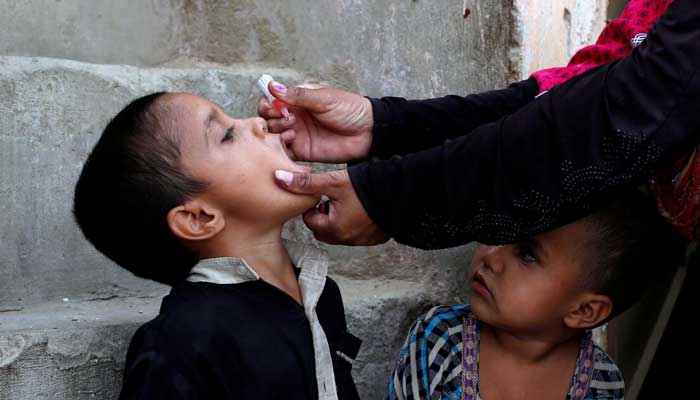KP reports 13 new polio cases in a single day
Emergence of the new case takes the total tally of polio cases in the province to 24
March 15, 2020

PESHAWAR: Khyber Pakhtunkhwa on Saturday reported 13 new cases of polio, the highest number for the province in a single day, taking the nationwide toll to 25 in the current year, reported The News.
According to the health department officials and Emergency Operation Centre (EOC) in Peshawar, the cases were mostly called circulating vaccine-derived poliovirus (cVDP2) or Type 2 polio.
Seven of the cases were reported from Khyber tribal district, while one case each was reported from Lakki Marwat, Bannu, Mardan, Nowshera, Bajaur and Lower Dir.
"Pakistan has this year reported 25 cVDP2 cases, in which Khyber Pakhtunkhwa alone had a share of 24," the report said.
“The reason of cVDPV2 outbreak is the result of a cohort of children without mucosal immunity to type 2 poliovirus. The cVDPVs occurs when supplementary immunisation activities (SIAs)/polio rounds are poorly conducted and the population is left susceptible to poliovirus whether from vaccine-derived or wild poliovirus,” a senior public health specialist told The News.
Read also: New polio cases reported in KP and Balochistan
“In other words, they were leaving a cohort continuously immunised in every round and not reaching every child,” the specialist said while requesting anonymity.
The specialist added that several senior Pakistani public health specialists had been raising genuine issues in the polio programme but, “they are either sidelined or kicked out of the programme.”
“It is a money-driven programme and huge salaries and incentives are being taken by the consultants at the top level. Unfortunately, some people in the programme are very influential and answerable to none and they set their agenda ignoring local needs and requirements,” he maintained, according to the pubication.
Another senior official said that after years of work in the polio programme, he had realised that eliminating polio was not the priority of those drawing huge salaries in Pakistan.
In 2019, Pakistan had reported 22 cases of cVDPV2, including 16 from KP. These were apart from WPV cases in 2020, it is 29 in the country and 15 in KP.
Read also: Independent monitoring of polio can help Pakistan’s anti-polio drive, says Rana Safdar
There are three wild types of poliovirus (WPV) – type 1, type 2, and type 3. These new viruses are called vaccine-derived polioviruses (VDPV) and can cause polio disease. After wild poliovirus type 2 was declared eradicated in 2015, the world switched from trivalent to bivalent OPV.
Officials said that after eradication of type 2 virus or VDPV, the vaccine was stopped in April 2016 in Pakistan. It again surfaced in 2019 and affected 16 children in KP and a total of 22 in Pakistan.
The experts added that type 2 does not cause paralysis. They felt the federal government would need to own the polio programme and introduce drastic changes in the national and provincial level by bringing it under the provincial governments if it wanted to make Pakistan polio-free.
The experts further said the big rise in polio cases has put a question mark because despite repeated campaigns poliovirus is yet to be eliminated in KP. They added the government would have to introduce the culture of merit and accountability in the programme.
“People with their strong political back up are holding key positions for years and getting thousands of dollars’ salaries. They must be held accountable for their failure in eliminating polio in the country and particularly in KP,” one of the experts said.
Originally published in The News











